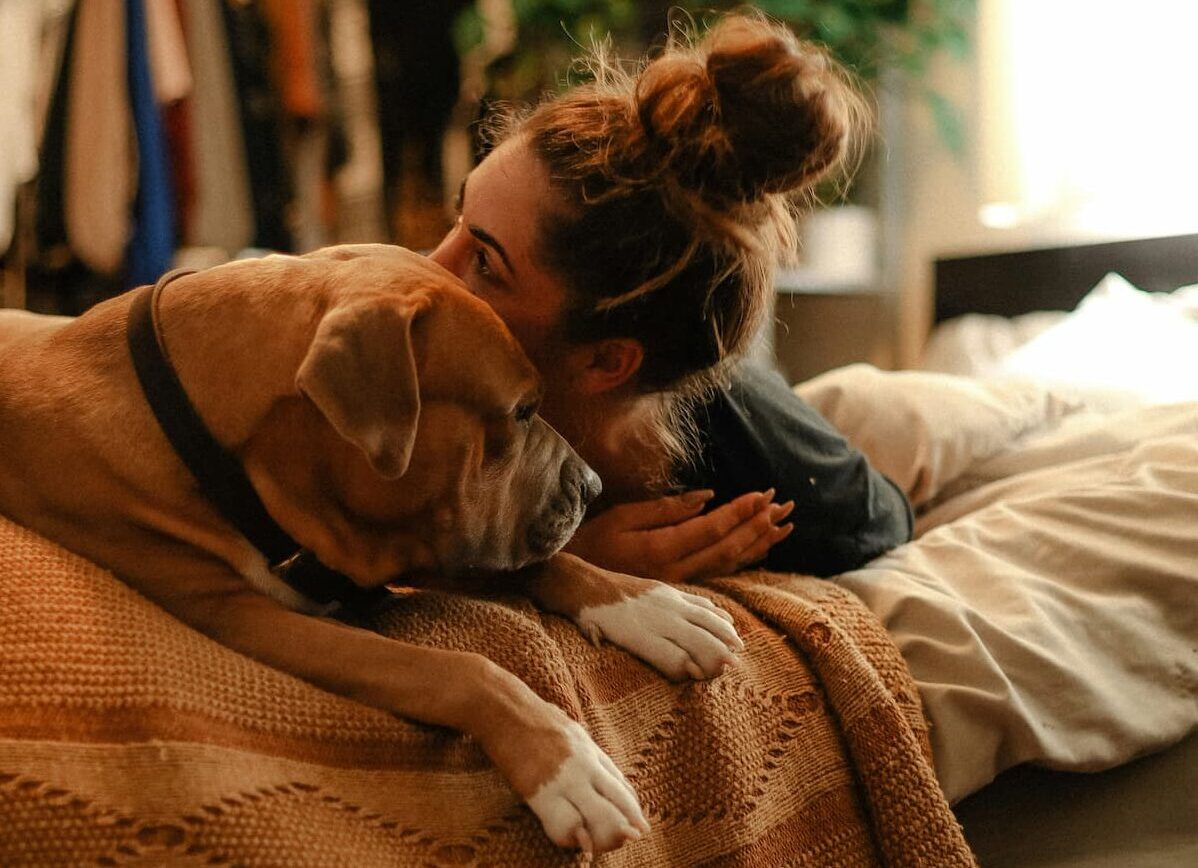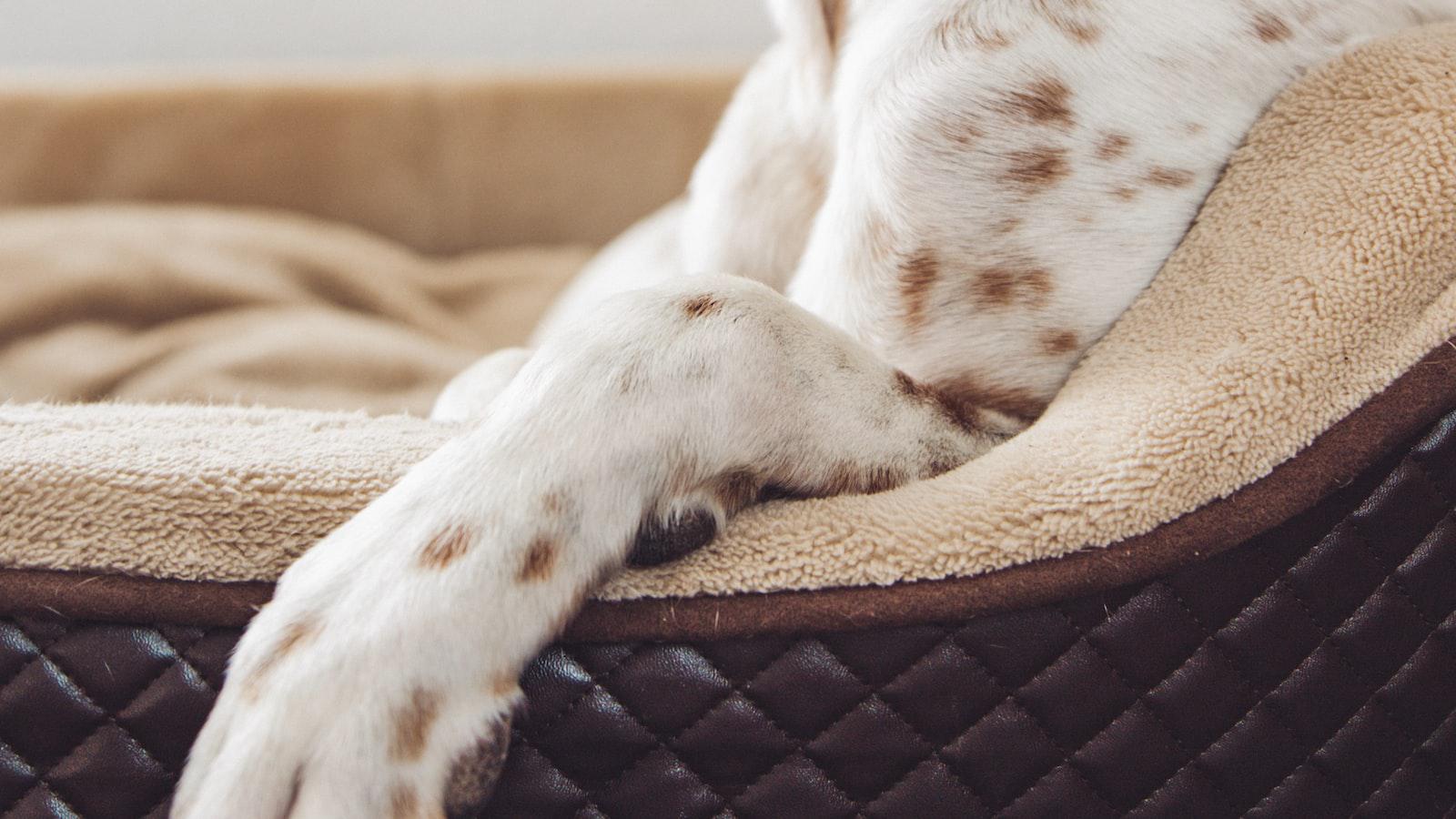Picture this: It’s been a long, tiring day, and all you want to do is crawl into your cozy bed and drift off to sleep, sharing sweet dreams with your loyal furry friend, Fido.
But as you slump onto your bed, ready to surrender to the blissful realm of slumber, you suddenly recoil in horror.
The unmistakable aroma hits you like a punch to the nostrils, and there it is – a rather unpleasant wet stain on your once-pristine sheets.
Yep, that’s right folks, your beloved pup has decided to mark their territory… on your bed.
As you try to comprehend why on earth your innocent little angel would commit such a heinous act, fear not, for in this article, we shall answer that perplexing question: Why do dogs pee on beds?
Decoding Why Dogs Pee on Beds, Understanding Scent Marking
Many dog owners have experienced the frustrating scenario of finding their beloved pet’s pee on the bed.
It’s not only baffling, but it can also be infuriating to constantly wash sheets and deal with the mess.
So, why do dogs pee on the bed?
It all has to do with scent marking.
Scent marking is an instinctual behavior that plays a crucial role in the canine world.
Dogs rely heavily on their sense of smell to communicate and navigate their environment, and one way they do this is through marking their territory with urine.
While it may be perplexing to discover your furry friend leaving their mark on your bed, it is important to understand the significance behind this behavior:
1. Territorial Marking: Dogs have a natural inclination to establish and defend their territory.
By urinating on different surfaces, such as your bed, they are leaving their scent behind as a way to assert their ownership and warn other animals to keep their distance.
Although it may seem frustrating, this behavior is deeply rooted in their instincts and serves as a means of communication in the canine community.
2. Anxiety: Just like us, dogs can experience anxiety.
Whether it’s separation anxiety caused by being away from their human companions or anxiety triggered by loud noises or unfamiliar situations, anxious dogs may seek comfort by urinating on familiar objects, like our beds.
It may seem counterintuitive, but for them, the scent of their own urine provides a sense of security and reassurance in an anxious moment.
3. Stress: Dogs, much like humans, can become stressed in certain situations.
Changes in routine, such as a new addition to the family or a move to a new house, can create stress for our furry pals.
When feeling overwhelmed, dogs may resort to peeing on our beds as a way to relieve tension and regain a sense of control in their environment.
It’s their way of saying, “Hey, I’m not okay with this change!”
Addressing Medical Causes Such Urinary Tract Infections and More
When it comes to our furry friends, encountering the occasional accident is not out of the ordinary.
However, if your beloved pup has taken to peeing on your bed, it could be a cause for concern.
While behavioral issues and territorial marking are common explanations, sometimes there are underlying medical reasons that need to be addressed.
One such condition is a urinary tract infection (UTI).
UTIs are not exclusive to humans; they can affect our canine companions too.
These infections occur when bacteria enter the urinary system, leading to discomfort for our dogs.
As a result, they may start peeing in unusual places, such as your bed.
Keep an eye out for other symptoms, including increased frequency of urination, signs of pain or discomfort, and even blood in the urine.
If you notice these signs, it’s crucial to consult your veterinarian, who can diagnose and provide appropriate treatment for your furry friend.
While UTIs are a common medical cause for dogs peeing on the bed, they are not the only culprits.
Other underlying ailments, such as bladder stones, can trigger similar behavior.
These small, rock-like formations can form in your dog’s bladder, causing discomfort and a higher risk of accidents.
In addition to urinary issues, keep an eye out for signs like frequent licking of the genital area, difficulty urinating, or even an unusual odor in your dog’s urine.
Remember, a trip to the vet can help identify these medical causes and ensure your pup’s health and well-being are properly addressed.
Resolve Issues with Effective Training Techniques and Strategies
Many dog owners have experienced the frustrating situation of finding their beloved pets leaving a surprise on their beds.
Here are some effective techniques and strategies to address this concern.
One of the main reasons behind this behavior is incomplete house training.
If your furry companion hasn’t yet mastered the art of potty training, accidents can happen, even on your precious bed.
Consistency is key when it comes to teaching your dog where it’s appropriate to relieve themselves, so make sure you establish a routine and stick to it.
Regular potty breaks, rewarding positive behavior, and gentle redirection will go a long way in helping your dog understand what’s expected of them.
Another factor that may contribute to this behavior is anxiety or stress.
Dogs can often exhibit signs of anxiety by urinating in inappropriate places, and your bed may unfortunately fall victim to this behavior.
Creating a calming environment for your furry friend is thus, essential.
Consider providing them with a cozy designated spot, such as a dog bed, where they can feel safe and secure.
Additionally, incorporating mental and physical exercise into their daily routine can greatly reduce their stress levels, making accidents less likely to occur.
Additionally, using natural calming aids, such as pheromone diffusers or calming supplements, can help reduce anxiety and prevent bed-wetting incidents.
Remember, punishing or scolding your dog for peeing on the bed is counterproductive.
Instead, focus on positive reinforcement and rewards when they go to the bathroom in appropriate areas.
Consistency is key when training your dog, so be patient and persistent.
By understanding the reasons behind this behavior and taking the necessary steps to address them, you can help your furry companion overcome this issue and enjoy a clean bed once again.
FAQ
Q: Why do dogs pee on the bed in the first place?
A: Ah, the million-dollar question!
Dogs may pee on the bed for various reasons, such as marking their territory, experiencing medical problems, behavioral issues, or even just being a little rebellious.
Q: Can you explain this whole marking territory thing?
A: Absolutely!
Dogs, being the descendants of wild wolves, still have some primal instincts in them.
By marking their territory, including our beds, they are leaving their scent to let other dogs know, “Hey, this place is mine!”
Q: How can I determine if it’s marking or something else?
A: Good question!
If your dog pees consistently in the same spot every time they’re on the bed, it might be marking.
But if it happens randomly and frequently, it could be due to another underlying problem.
Q: What other possible causes should I look out for?
A: Besides marking, there could be medical issues.
Urinary tract infections, bladder stones, or even incontinence can lead to accidents on the bed.
Also, if your pup is feeling anxious, stressed, or hasn’t been properly potty trained, bed-wetting may occur.
Q: Should I take my dog to the vet if they pee on the bed?
A: Absolutely!
It’s always a great idea to consult with a veterinarian if you’re concerned about your furry friend’s behavior.
They can rule out any medical conditions and provide appropriate advice or treatments.
Q: How can I prevent my dog from peeing on the bed?
A: Well, there are a few things you can try.
Firstly, ensure your pup has regular potty breaks throughout the day to avoid any accidents caused by a full bladder.
Making sure your dog is properly crate trained can also help prevent bed-wetting incidents.
Lastly, cleaning the bedding thoroughly with enzymatic cleaners can eliminate any lingering smells that may encourage them to pee on the bed again.
Q: Are there any behavioral tips to address this issue?
A: Absolutely!
Consistency is key when it comes to training.
Reinforce good behavior by providing praise, treats, and rewards when your dog eliminates outside or in their designated potty area.
When accidents happen, avoid punishment as it can confuse your dog and potentially exacerbate the issue.
Instead, focus on positive reinforcement and redirecting their behavior.
Q: Is it possible to successfully train older dogs not to pee on the bed?
A: Yes, it is!
While it may be a bit more challenging with older dogs, it’s never too late to retrain them.
Patience, consistency, and positive reinforcement are vital.
Remember, every dog is different, so it may take a little time and effort to break those bad habits.
Q: Any final advice for dog owners dealing with this issue?
A: Definitely!
Remember to show empathy towards your furry friend.
Understanding the root cause of the problem and addressing it with love and patience will help both you and your dog overcome this challenge together.
And don’t worry, accidents happen, but with proper training and a little bit of time, you can keep your bed pee-free in no time!
To Wrap It Up
Whether it’s a medical issue, a sign of anxiety, or even a territorial marking, it’s important to remember that our furry friends have their own unique ways of communicating with us.
So, the next time you find a soggy surprise on your mattress, don’t panic!
Take a deep breath, assess the situation, and consult your vet if needed.
With a little understanding and patience, we can work together to address this issue and create a cozy, dry haven for both you and your beloved canine companion.
Here’s to a future filled with wagging tails and strictly bathroom-related activities.
Cheers!














